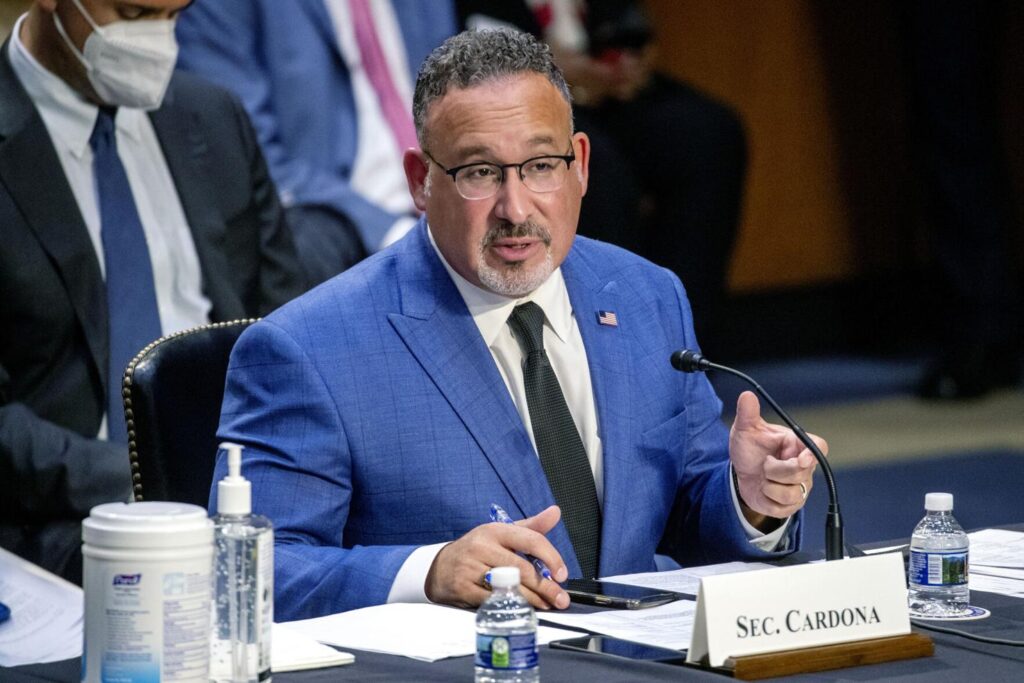The Center Square
By John Haughey
October 12, 2021
“The application charts a “COVID-19 slide” in comparing assessment scores from 2019 to 2021, with significant declines in algebra and geometry in the upper grades and mathematics for third- to eighth grade students.”

(The Center Square) – Florida last week became the last state request the last-third of $7 billion in federal pandemic assistance – about $2.3 billion – approved for state schools under the American Rescue Plan Act (ARPA) adopted in March.
Two days after U.S. Department of Education (DOE) Deputy Assistant Secretary for Policy & Programs Ian Rosenblum asked state officials on Oct. 4 why they missed repeated deadlines – the original was June 7 – in applying for ARPA Elementary & Secondary School Emergency Relief (ESSER) funds, the state’s Department of Education (FDOE) filed its request
FDOE’s 432-page application includes a letter from Florida Education Commissioner Richard Corcoran to U.S. Education Secretary Miguel Cardona maintains the request was filed late because Florida opened schools earlier than most states and had a massive data bloc to sort through in building its application.
“As Florida has been a national leader in offering in-person instruction five-days-a-week, we were able to assess 94% of our students in person for statewide, standardized assessment in Spring 2021,” Corcoran wrote.
The application charts a “COVID-19 slide” in comparing assessment scores from 2019 to 2021, with significant declines in algebra and geometry in the upper grades and mathematics for third- to eighth grade students.
Florida’s Black and low-income students, as well as those with disabilities, have seen the most significant declines in academic achievement according to FDOE.
“Among low-income families, the majority are not scoring at grade-level for language arts, math, algebra or geometry,” FDOE notes, adding before the pandemic, 50% or more of low-income family students achieved grade level in math and algebra while this year, just 36% did so – a 15% decline from 2019. In geometry, 33% of low-income students scored at grade level, a 13% drop from 2019.
The DOE documents similar “COVID-19 slide” in third- through eighth grade students from low-income families in mathematics with only 39% scoring at grade level, 12% below 2019 achievement levels.
“The data reinforces the need to accelerate learning in reading and math in order to close gaps negatively impacted by the pandemic,” DOE’s application maintains.
Florida plans to address achievement slides through a new Civics Literacy Excellence Initiative, “SAT/ACT test-taking at no cost to high school juniors again in 2022,” professional development for reading coaches and more support for dual-enrolled students in high school and college for computer science/IT fields.
Rosenblum’s Oct. 4 letter warning Florida could leave $2.3 billion in pandemic assistance on the table prompted Gov. Ron DeSantis’ Office to claim, “No district has articulated a need for funding that cannot be met with currently available resources.”
That response, in turn, drew a firestorm from school district officials, educators and Democrats who said DeSantis, Corcoran and other Republican state leaders are more invested in winning contrived “culture wars” over mask mandates and critical race theory than in educating the state’s nearly 3 million K-12 children.
“Good morning, @GovRonDeSantis. It’s a good day to stop defunding schools and apply for an additional $2.3 billion, like literally every other state in the country,” tweeted state Agriculture Commissioner Nikki Fried, Florida’s only statewide-elected Democrat and among candidates seeking the party nod to challenge DeSantis’ 2024 reelection bid.
But in its application, FDOE maintains, “Florida has NEVER missed any deadline” and that state officials “communicated well in advance” they needed more time to analyze year-end student achievement data.
FDOE cites an Aug. 2 email stating it would share its application with the State Board of Education before submitting it to DOE, not that it would be approved then.


The ability of Republican politicians to reframe the situation, even when it is contradictory and full of lies, is just remarkable. The ability of its rank and file to forget what was said yesterday and accept the current reframing is even more remarkable.
Ditto, Mark Tomes, below. It involves “coa”, dereliction, and only $2,300,000,000 (and our kids).